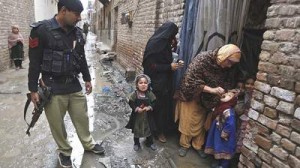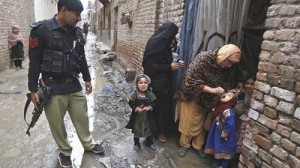- While the country’s path to eradication hasn’t been easy, there is now reason for optimism
Foreign Policy Magazine
JAVED JABBAR
 Every morning, Naseeba travels to the local health facility in Taxila, Pakistan, to collect a cooler packed with polio vaccines. With these, an area map, and tally sheets in hand, she then begins her daily journey, joining thousands of Pakistani citizens who go door-to-door with a single goal in mind: ending polio.
Every morning, Naseeba travels to the local health facility in Taxila, Pakistan, to collect a cooler packed with polio vaccines. With these, an area map, and tally sheets in hand, she then begins her daily journey, joining thousands of Pakistani citizens who go door-to-door with a single goal in mind: ending polio.
Over the last 25 years, millions of health workers like Naseeba have gone to incredible lengths to vaccinate children against polio around the world. It is because of them that we’re now closer than ever to seeing this paralyzing disease wiped from the planet. Last year, there were fewer than 100 cases reported worldwide, and now Pakistan is one of just two countries (along with its neighbor, Afghanistan) where polio remains. While Pakistan’s path to eradication hasn’t been easy, there is now reason for optimism. The country has recorded a 64 percent reduction in cases so far in 2016, compared to the same time last year.
Unfortunately, violent attacks — which have, at times, affected health workers and those who protect them — have overshadowed this remarkable progress.
These incidents are tragic, although not entirely unexpected. The polio virus has, historically, thrived in regions experiencing political turmoil and conflict. In fact, many of the places where polio still has a strong hold are insecure areas of Afghanistan and Pakistan. So health workers like Naseeba, who go bravely and tirelessly door-to-door, are working in some of the most challenging environments on Earth.
Even in the face of this violence, the dedication to stopping polio in Pakistan extends to all levels of society. In order to reach all of Pakistan’s 35 million children, nearly a quarter of a million clinicians, mothers, religious leaders, security personnel, community members, and government officials have come together to support eradication efforts. Through direct coordination between local workers and government officials, the polio program has been able to tailor strategies based on the needs of communities, and even specific families. In areas where knowledge of polio and vaccines is minimal, local community members and female vaccinators have been trained to educate people about the importance of the anti-polio campaign. The government has also established temporary clinics within these villages, creating a dynamic and adaptable campaign.
In more conservative areas of Pakistan, some families have refused polio immunization for their children due to religious beliefs or misconceptions about the vaccine. To encourage vaccination in these areas, over 2,000 religious leaders have issued statements in favor of immunization, endorsed by the Pakistani government, and are speaking out on the importance of the polio campaign. These leaders have also held jirgas, or councils, allowing them to address religious concerns in the community. The Pakistani government has demonstrated its strong commitment to eradicating polio by spearheading innovative strategies to facilitate better institutional coordination. Emergency operations centers have been set up across Pakistan, serving as local bases for polio workers to document and consolidate activities. A national emergency action plan was designed to enhance the quality of vaccination campaigns and improve surveillance in the final leg of the push. Now, regions in which the virus has persisted, such as Karachi, Quetta, and the Khyber-Peshawar corridor, are regularly subjected to environmental surveillance, allowing for more comprehensive and reliable monitoring. These strategies have transformed the polio campaign from an isolated health project to a national movement. Studies have shown that more than 98 percent of parents in Pakistan accept polio vaccines for their children, a rate higher than that in parts of North America and Western Europe. Programmatic innovations have also allowed the campaign to reach more children than ever before. Between 2013 and 2015, the number of children previously inaccessible to vaccination teams fell dramatically, from half a million to 35,000. Of course, there is more work to be done in Pakistan, to ensure that the country protects its progress against polio and can stop transmission once and for all. This includes taking steps to improve the quality of vaccination campaigns, ensuring that no child is being missed, and coordinating closely with Afghanistan on strategies. But allowing violence to dominate global discussions of polio eradication in Pakistan detracts from the tremendous work already being done on the ground, including by brave individuals like Naseeba who have volunteered for the cause. With fewer polio cases and more polio campaigns than ever, the pieces are now in place for Pakistan to help take the world over the finish line in stopping this disease. By focusing on this progress and the steps being taken to end polio in Pakistan, we can better honor the remarkable dedication of the healthcare workers on the ground.



